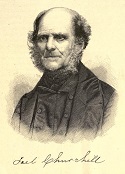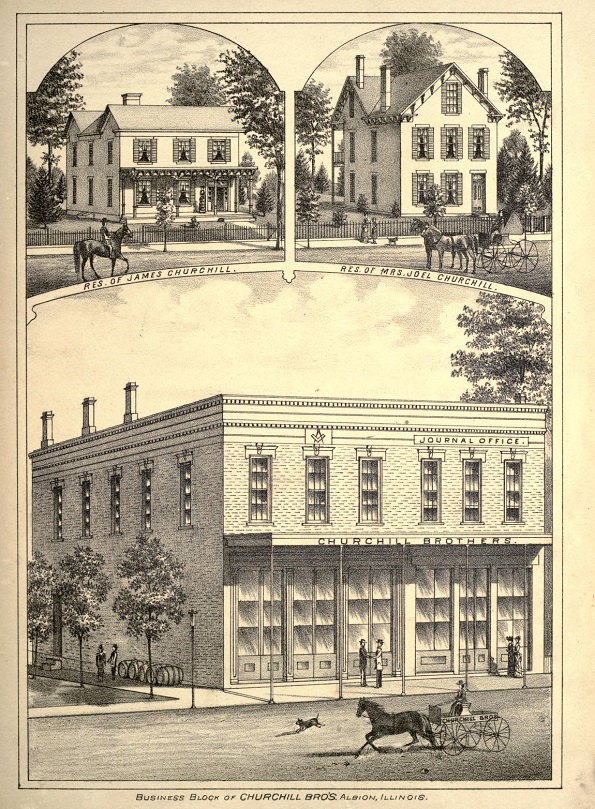Biography - JOEL CHURCHILL
 For
many years the merchant prince not only of Edwards, but of adjoining
counties - Joel Churchill - is worthy of mention. He was born in Exeter,
England, December 16, 1792. His father, Samuel Churchill, was a manufacturer
of cloth, and a ship owner. A brother was at one time the largest ship-owner
in Great Britain. Joel was ever active in reaching out for trade. He visited
Asia, the British possessions in Southern Africa, and traveled through
Continental Europe. In 1820 he came to Edwards county, where he determined
on farming, but it proved too inactive for him, or, rather, was so different
to the life he had always lived, that he soon forsook it, in 1823, to enter
upon that career of merchandising that made him well known throughout
Southern Illinois. It is said that for years he was the only merchant who
paid cash for articles of home production brought to his establishment, the
plan being that of exchange, made so largely through the scarcity of money.
He married Eliza Simpkins, daughter of William Simpkins, a miller by trade,
in December, 1825. By her he had eleven children, nine of whom are living.
He had been raised a Quaker, although he never embraced the faith. It is
related that whenever he visited Philadelphia, he adopted the speech
peculiar to those people, and for several days subsequent to his return it
was "thee" and "thou" to everyone - so much so, that a citizen meeting him
and hearing him in conversation would say, Churchill has just returned from
Philadelphia. For many years he was post-master. He transacted much business
for others - his remittances by draft and otherwise reaching as high as
sixty or seventy thousand dollars per annum, a large sum for the early days.
One method of sending money is worthy of remark. He would take a bank note,
cut it in halves, and send the parts separately, oftentimes by different
mails, to insure their safe transit. He was an Old Line Whig of the most
emphatic class, and right royally did he stand up for the party's
principles. Just before the war, he went to Washington and Philadelphia to
protect his interests, owning as he did Georgia bonds, and then was a most
prominent Union man. A son, Charles, who together with another, James,
succeed him in business, went out as a Captain. He died March 16th, 1872.
His benefactions to young men struggling for a start in life are treasured
in the memory of many who are now among the wealthiest citizens of Edwards
county.
For
many years the merchant prince not only of Edwards, but of adjoining
counties - Joel Churchill - is worthy of mention. He was born in Exeter,
England, December 16, 1792. His father, Samuel Churchill, was a manufacturer
of cloth, and a ship owner. A brother was at one time the largest ship-owner
in Great Britain. Joel was ever active in reaching out for trade. He visited
Asia, the British possessions in Southern Africa, and traveled through
Continental Europe. In 1820 he came to Edwards county, where he determined
on farming, but it proved too inactive for him, or, rather, was so different
to the life he had always lived, that he soon forsook it, in 1823, to enter
upon that career of merchandising that made him well known throughout
Southern Illinois. It is said that for years he was the only merchant who
paid cash for articles of home production brought to his establishment, the
plan being that of exchange, made so largely through the scarcity of money.
He married Eliza Simpkins, daughter of William Simpkins, a miller by trade,
in December, 1825. By her he had eleven children, nine of whom are living.
He had been raised a Quaker, although he never embraced the faith. It is
related that whenever he visited Philadelphia, he adopted the speech
peculiar to those people, and for several days subsequent to his return it
was "thee" and "thou" to everyone - so much so, that a citizen meeting him
and hearing him in conversation would say, Churchill has just returned from
Philadelphia. For many years he was post-master. He transacted much business
for others - his remittances by draft and otherwise reaching as high as
sixty or seventy thousand dollars per annum, a large sum for the early days.
One method of sending money is worthy of remark. He would take a bank note,
cut it in halves, and send the parts separately, oftentimes by different
mails, to insure their safe transit. He was an Old Line Whig of the most
emphatic class, and right royally did he stand up for the party's
principles. Just before the war, he went to Washington and Philadelphia to
protect his interests, owning as he did Georgia bonds, and then was a most
prominent Union man. A son, Charles, who together with another, James,
succeed him in business, went out as a Captain. He died March 16th, 1872.
His benefactions to young men struggling for a start in life are treasured
in the memory of many who are now among the wealthiest citizens of Edwards
county.
Extracted 12 Aug 2017 by Norma Hass from 1883 A Combined History of Edwards, Lawrence, and Wabash Counties, Illinois, page 215.




